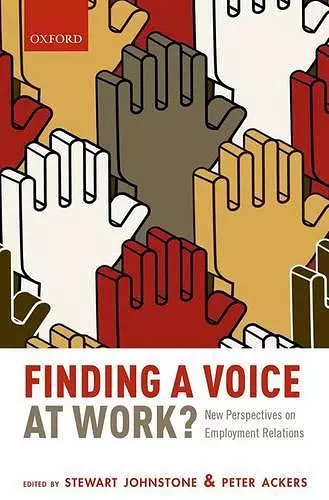Finding a Voice at Work?
New Perspectives on Employment Relations
Stewart Johnstone editor Peter Ackers editor
Format:Hardback
Publisher:Oxford University Press
Published:19th Feb '15
Currently unavailable, and unfortunately no date known when it will be back
This hardback is available in another edition too:
- Paperback£46.49(9780199668014)

How much 'say' should employees have in the running of business organizations, and what form should the 'voice' take? This is both the oldest and latest question in employment relations. Answers to these questions reflect our fundamental assumptions about the nature of the employment relationship, and inform our views on almost every aspect of Human Resource Management (HRM) and Employment Relations. Voice can also mean different things to different people. For some, employee voice is a synonym for trade union representation which aims to defend and promote the collective interests of workers. For others voice, is means of enhancing employee commitment and organisational performance. Others advocate workers control as an alternative to conventional capitalist organisations which are run for shareholders. There is thus both a moral and political argument for a measure of democracy at work, as well as a business case argument, which views voice as a potential link in the quest for increased organisational performance. The key debate for employment relations is which of the approaches 'works best' in delivering outcomes which balance competitiveness and productivity, on the one hand, and fair treatment of workers and social justice on the other. Policy makers need pragmatic answers to enduring questions: what works best in different contexts, what are the conditions of success, and what are the drawbacks? Some of the most significant developments in employee voice have taken place within the European Union, with various public policy and employer experiments attracting extensive academic research. The book offers a critical assessment of the main contemporary concepts and models of voice in the UK and Europe, and provides an in-depth theoretical and empirical exploration of employee voice in one accessible and cohesive collection.
The analysis is detailed and clear, and there are nice thematic links and relationships between the chapters. The competing unitary/pluralist, organizing/partnership analytic perspectives are developed to good effect through the chapters, as is the discussion about voice in relation to Hall and Soskices varieties of capitalism. This overlap across the chapters, and the different viewpoints expressed in them, is useful for stimulating thought. The writing style should be relatively easy for students to digest, and certainly some of the chapters would be ideal for undergraduate teaching material. On this basis, the book would be an excellent library resource for those researching, teaching or learning about employment relations and voice. * Clare Mumford, Personnel Review *
There are now a lot of voices in the employee voice field. Finding a Voice at Work? stands out by bringing together an accomplished set of authors to provide diverse perspectives in a single book. From conceptual foundations to debates over British trade union strategies to perspectives from Europe and beyond, the stimulating chapters deepen the readers understanding of the fundamental question, why does workplace voice matter and which versions work best? I highly recommend this insightful collection. * Professor John W. Budd, University of Minnesota *
This book offers important and novel insights into work and employment relations. It is essential reading for those interested in such vital workplace issues as: unions, voice, communications, performance, consultation, participation, employee involvement, and engagement. * Professor Greg Bamber, Monash University, co-editor of International & Comparative Employment Relations *
Finding a Voice at Work? will no doubt become a benchmark text for all those researching and teaching the changing nature of employment relations. With an impressive list of leading contributors, the book examines the key question of why voice still matters for employment relations and society from a conceptual, empirical and comparative standpoint. It offers a sharp and compelling analysis for why employee voice should be at the centre of public policy debate. * Professor Mark Stuart, Director of CERIC and Montague Burton Professor of Human Resource Management and Employment Relations, University of Leeds *
ISBN: 9780199668007
Dimensions: 240mm x 163mm x 25mm
Weight: 654g
336 pages